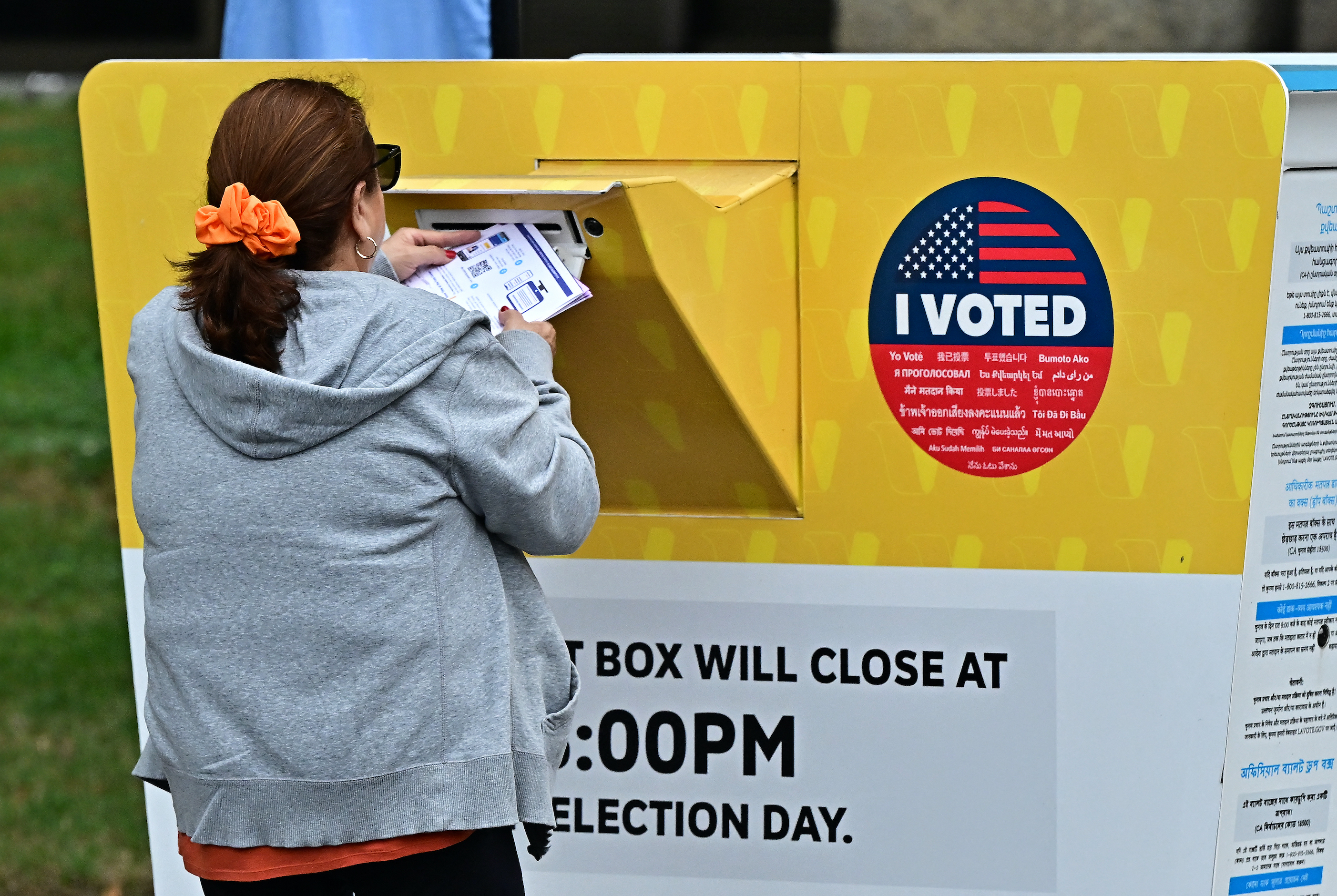California voters considered 10 ballot measures during the Nov. 5 election. From public safety to education, health care, minimum wage, and more, voters have made their choices on which propositions should become law.
Felony Charges for Drug and Theft Crimes
Deemed the most important ballot measure by respondents to a poll conducted by the Public Policy Institute of California,
Proposition 36—which strengthens penalties for repeat offenders of certain drug and theft crimes—may soon become the law of the state after more than 70 percent of voters approved the measure, according to unofficial preliminary results released late on Nov. 5.
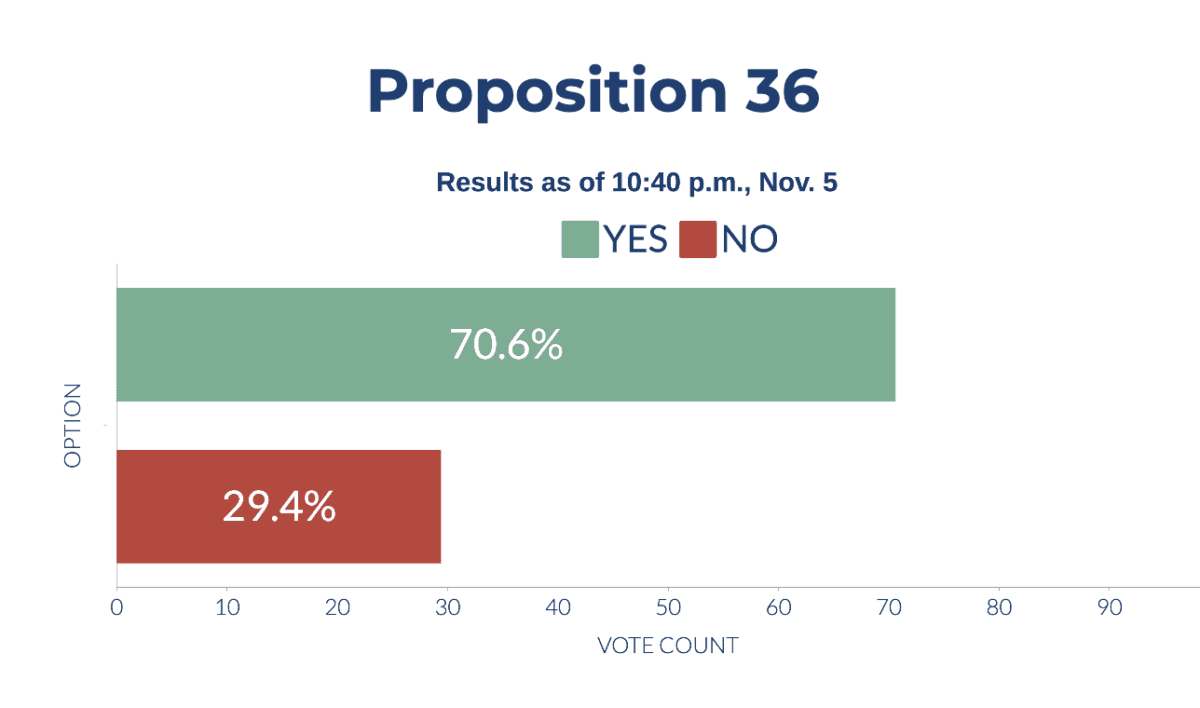
Preliminary results of California's Proposition 36 on Nov. 5, 2024. (Sophie Li/The Epoch Times)
Known as the Homelessness, Drug Addiction, and Theft Reduction Act, Prop. 36 also prioritizes mental health and drug abuse treatment by allowing some repeat offenders to choose rehabilitation programs in lieu of jail or prison sentences.
Supporters said the measure is needed to address the impacts of Proposition 47—passed by voters in 2014 to lower prison populations by reducing some drug and theft crimes from felonies to misdemeanors—which they believe contributed to higher levels of certain criminal activity in the past decade.
The state’s violent crime rate bottomed in 2014—hitting a 50-year-low of 391 incidents per 100,000 residents—but has risen to 503 per the same size population, as of 2023, according to an October fact sheet from the Public Policy Institute of California, a nonpartisan research organization.
Critics, including Gov. Gavin Newsom, repeatedly said in the past months that the proposition is a return to the War on Drugs and warned that prison populations would spike if it became law.
School Bond
On election night,
Proposition 2 was winning with nearly 57 percent of the vote, authorizing $10 billion in general obligation bonds to fund school improvements, including construction, repairs, and upgrades.
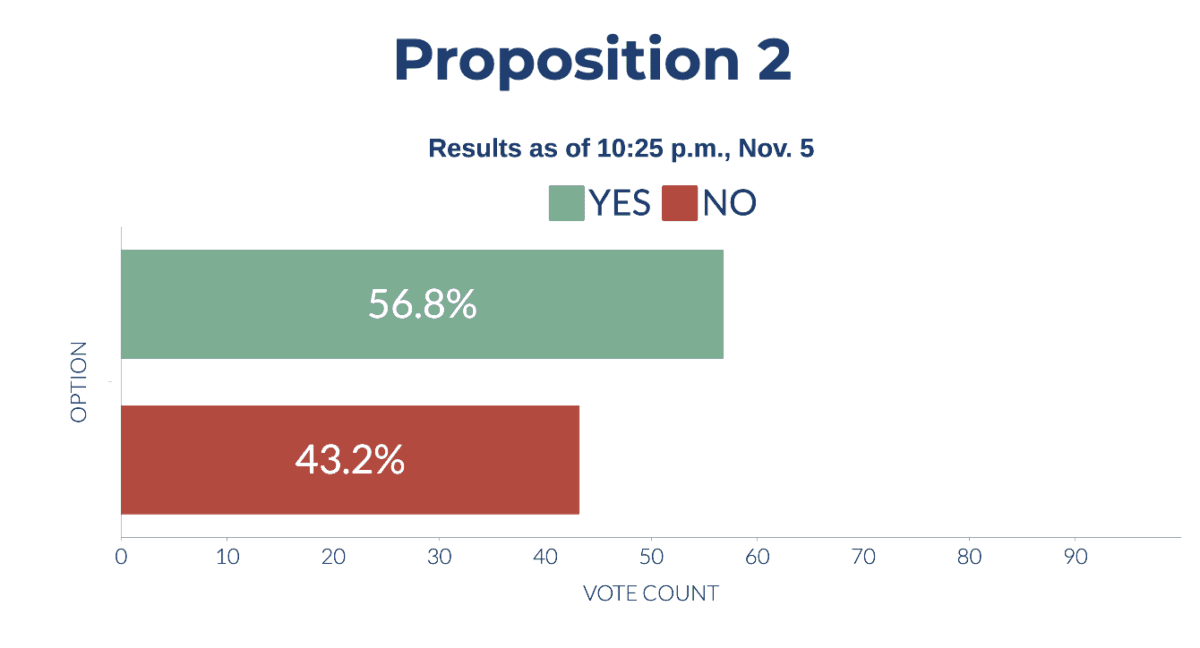
Preliminary results of California's Proposition 2 on Nov. 5, 2024. (Sophie Li/The Epoch Times)
The money will fund projects at grade K–12 public schools, community colleges, and technical education programs statewide.
Proponents, including Assemblyman Al Muratsuchi, said the money is needed to repair roofs, electrical systems, water and sewer lines, and provide other infrastructure upgrades.
“It’s time we brought our schools into the 21st century,” Muratsuchi told The Epoch Times.
Critics said the state can’t afford to borrow the money.
“The state’s broke and can’t afford this,” Assemblyman Bill Essayli told The Epoch Times. “The legislature should prioritize this and put it in the budget instead.”
To repay the bond, the nonpartisan Legislative Analyst’s Office estimates annual costs of approximately $500 million for 35 years—including about $8 billion in interest.
Wildfire and Water Bond
Another bond proposal,
Proposition 4, would authorize $10 billion in general obligation bonds to fund efforts to prevent and respond to droughts, floods, and wildfires.
The proposition garnered 58 percent of the vote in favor in early results.
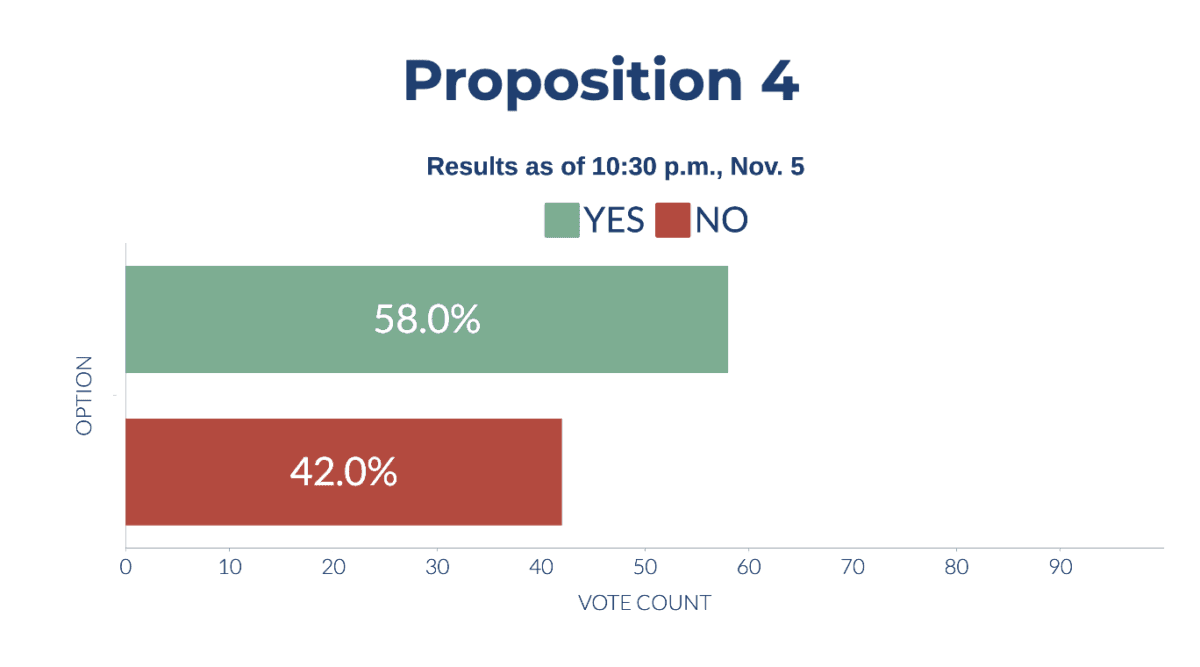
Preliminary results of California's Proposition 4 on Nov. 5, 2024. (Sophie Li/The Epoch Times)
Supporters said the money would benefit first responders.
The state would need to pay about $400 million annually for the next 40 years to pay back the bonds, according to the analyst’s office.
Critics said borrowing money to cover costs is problematic and jeopardizes future budgets.
Marriage Legality
The California Constitution has been amended by
Proposition 3, which deletes language that says only marriage between a man and a woman is legal and valid, according to preliminary results. Nearly 63 percent of voters were in favor of the measure.
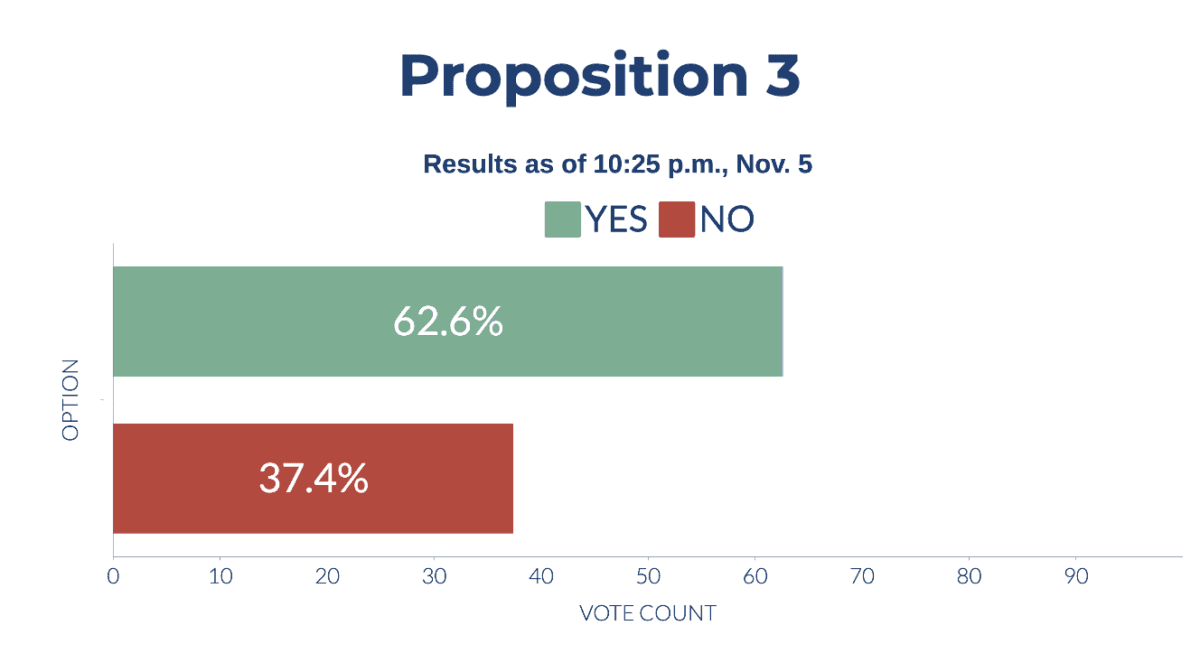
Preliminary results of California's Proposition 3 on Nov. 5, 2024. (Sophie Li/The Epoch Times)
Supporters said the amendment brings the text of the state’s founding document in line with current legal standards and provides additional protection for same-sex couples.
Critics said the change would make the statute’s language too vague and could be interpreted to make incest, child marriage, or polygamy legal.
Prescription Drug Revenue Spending
A complex measure that requires certain providers to use 98 percent of revenues for patient care appears to have been approved by voters, with 51 percent of voters in support.
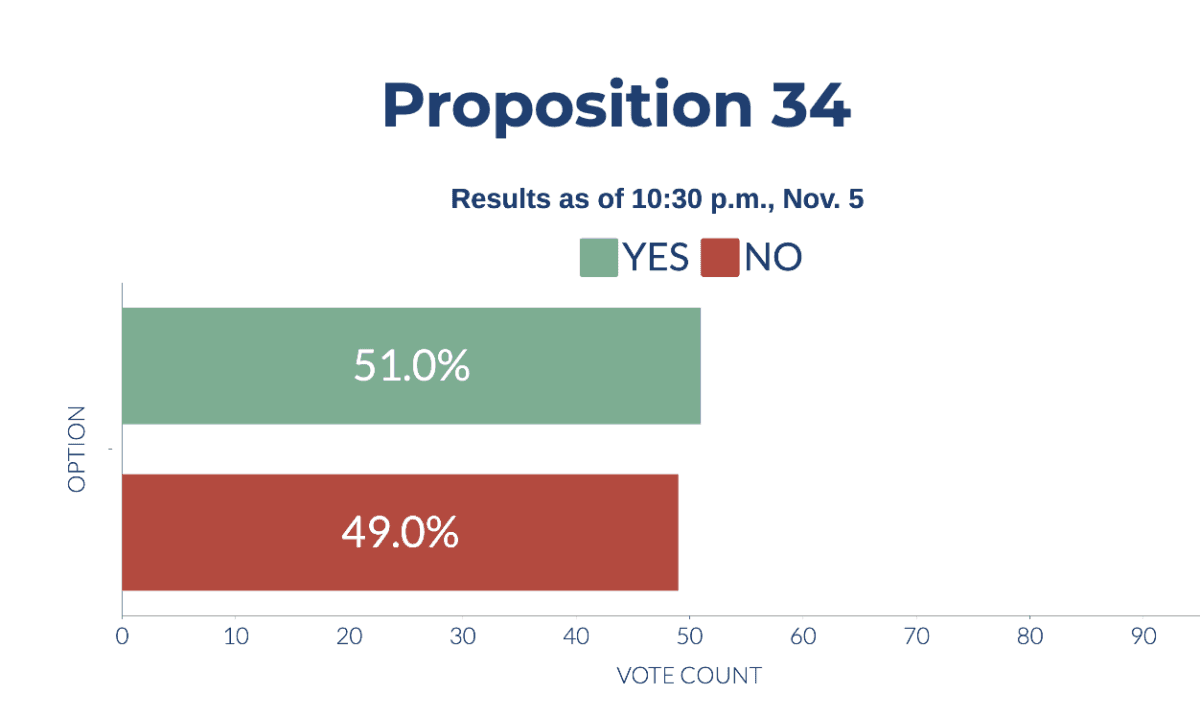
Preliminary results of California's Proposition 34 on Nov. 5, 2024. (Sophie Li/The Epoch Times)
Proposition 34 applies to organizations that received more than 500 health and safety violations while operating multifamily housing units, and spent at least $100 million in a 10-year period on purposes that do not qualify as direct patient care.
The AIDS Healthcare Foundation could be affected and forced to comply or risk being charged noncompliance penalties, loss of nonprofit status, and revocation of health care licenses.
Analysts estimate annual enforcement costs of millions of dollars to the state. However, fees charged for noncompliance could recoup the expenditures.
Supporters said the new law will protect patients.
Critics called the proposal a “grave danger to democracy.”
Managed Care Tax Extension
Californians voted in favor of
Proposition 35, which would make permanent an existing tax on managed health care insurance plans, according to early results. More than 67 percent of voters supported the measure.
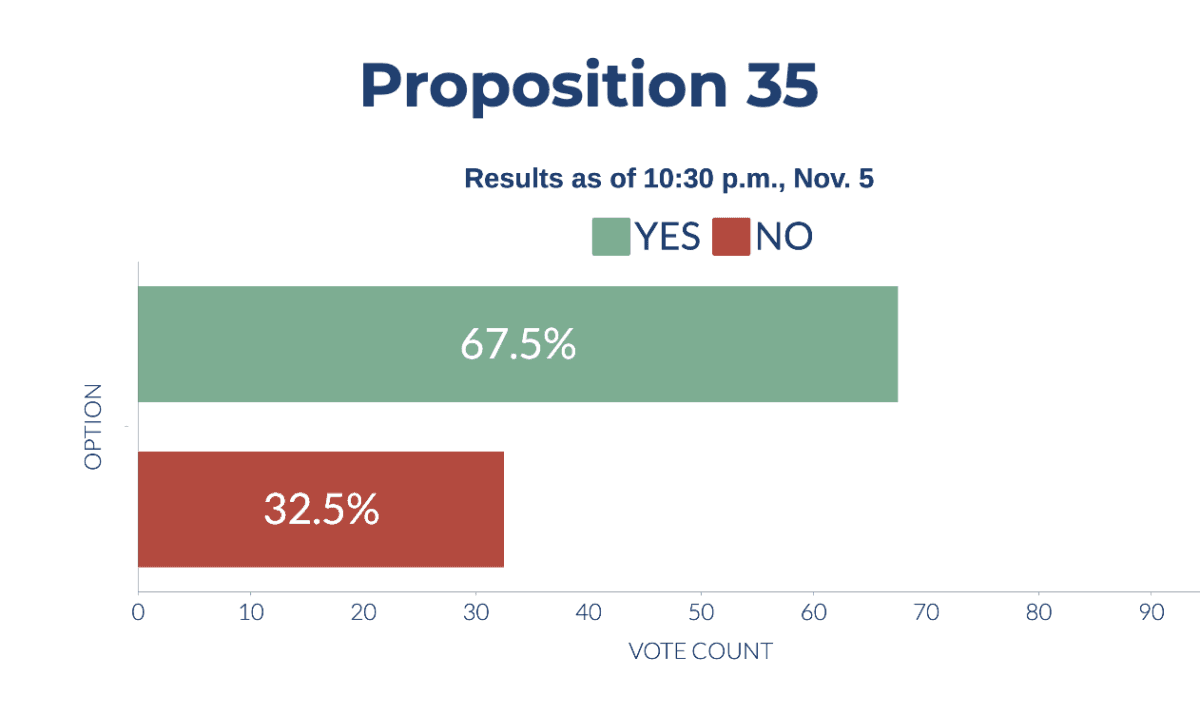
Preliminary results of California's Proposition 35 on Nov. 5, 2024. (Sophie Li/The Epoch Times)
If it is approved by voters, California would see costs increase by $1 billion to $2 billion in 2025 and 2026, according to analysts, because the proposition would reduce the amount of tax revenue the state could use to pay existing Medi-Cal costs.
Supporters said the measure would have expanded access to health care services and would not have raised taxes on individuals.
Voter Approval Requirement
Californians rejected
Proposition 5, which would have made it easier to raise taxes.
More than 56 percent of voters voted “No” on the measure, according to early results.
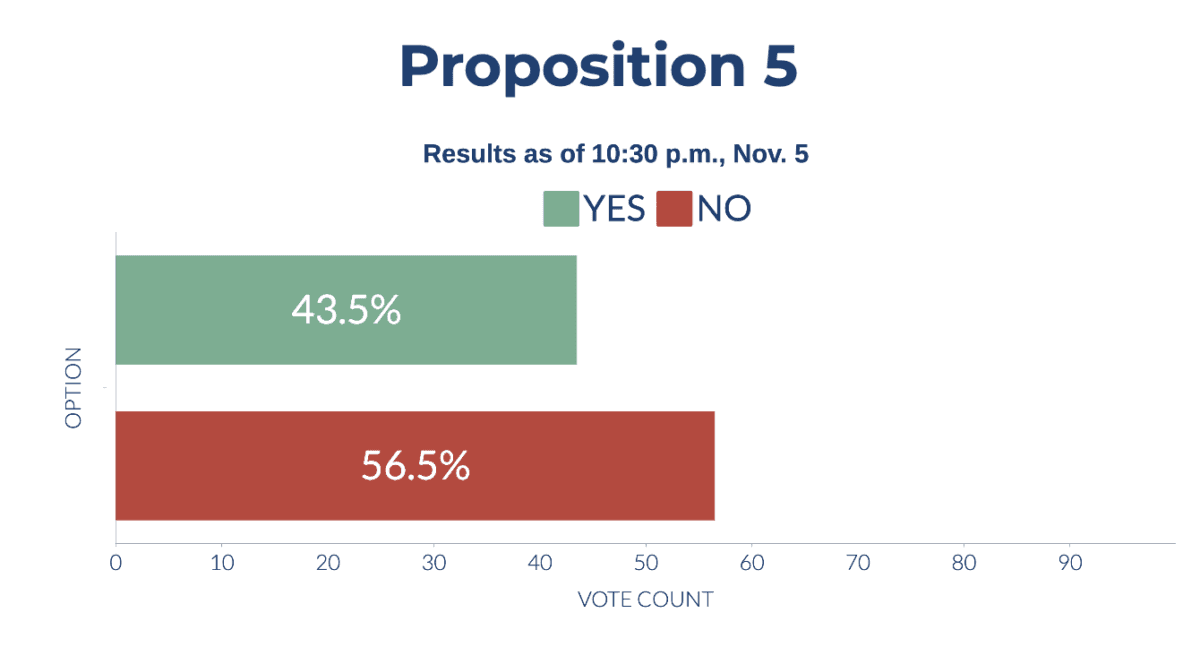
Preliminary results of California's Proposition 5 on Nov. 5, 2024. (Sophie Li/The Epoch Times)
The proposition would have allowed local bonds for infrastructure and housing to be passed with 55 percent voters’ approval instead of the two-thirds currently required by state law.
By making it easier to pass bond measures, borrowing costs would increase and would be paid back with higher property taxes, analysts said.
Proponents said the proposition would have helped the state improve housing availability.
Involuntary Work in Prison
Voters rejected
Proposition 6, which would have amended the state Constitution to prevent corrections officials from ordering inmates to work.
Over 54 percent of voters disapproved of the measure in preliminary results.
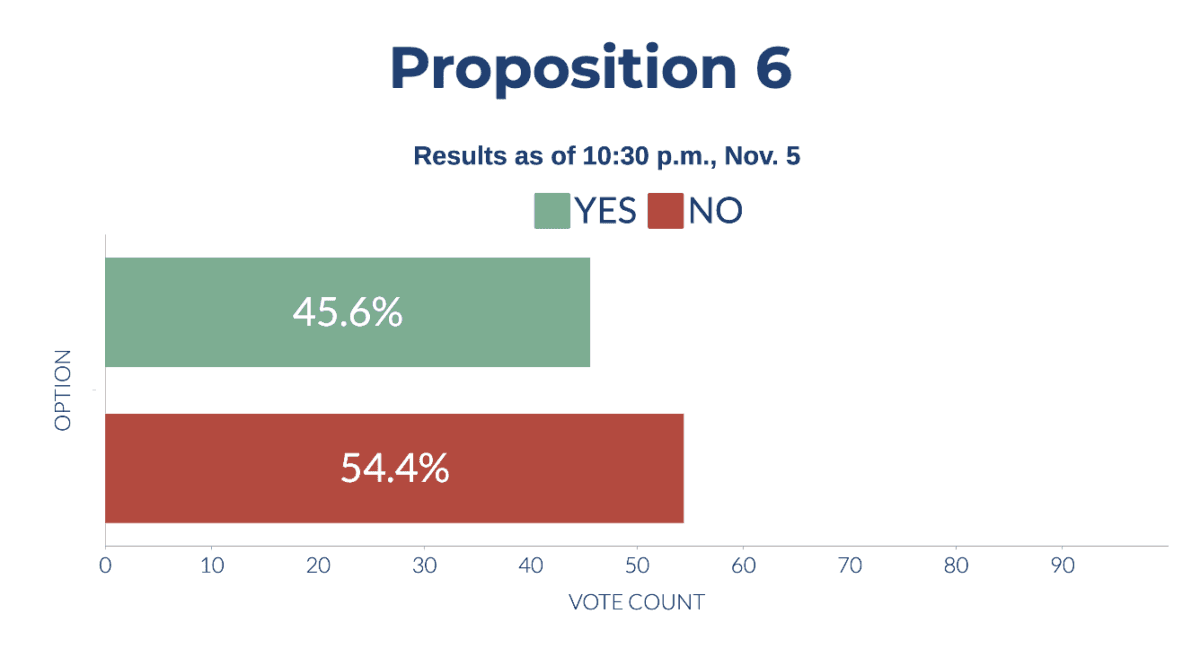
Preliminary results of California's Proposition 6 on Nov. 5, 2024. (Sophie Li/The Epoch Times)
Under existing law, jails and prisons can require incarcerated people to work—in janitorial, kitchen, and housekeeping jobs, among others—or participate in education and training programs.
Approximately one in three inmates work across the state, with many receiving credits to reduce their sentences while earning less than $1 per hour, according to the analyst’s office.
Those who refuse to work can be penalized with various consequences, including losing access to visitors, the commissary, or phones, among other things.
Minimum Wage
Voters rejected
Proposition 32, which sought to increase the state’s minimum wage by $2 to $18 per hour in early unofficial results. Nearly 52 percent of voters said “No” to the measure.
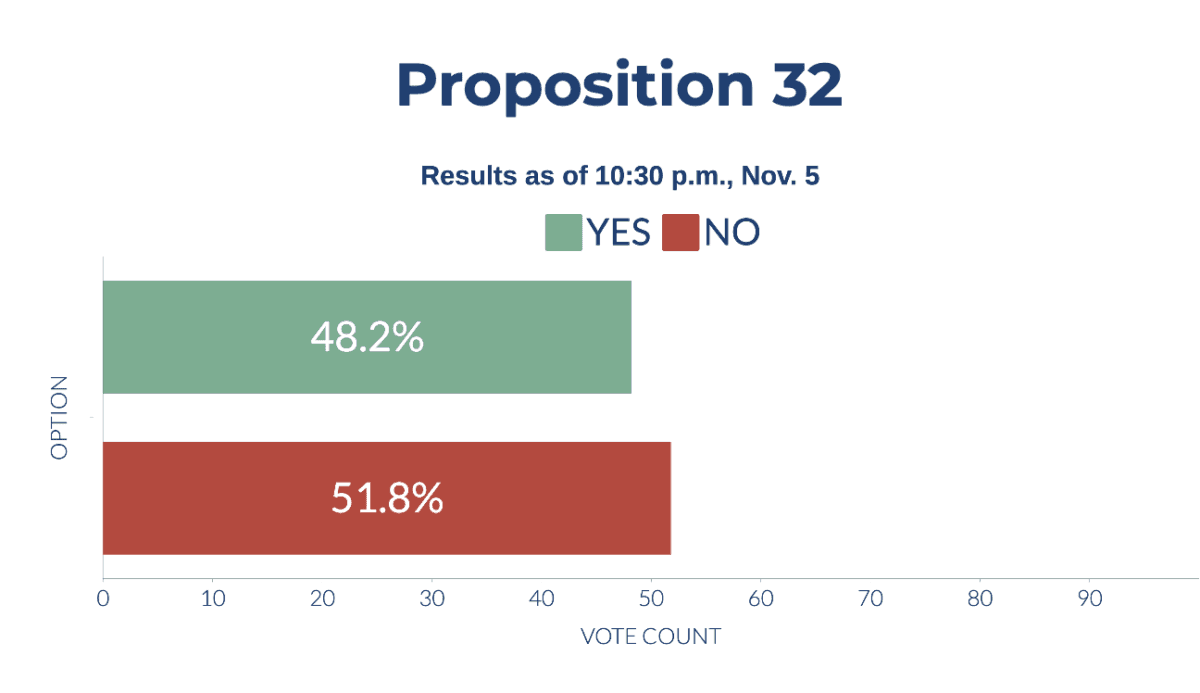
Preliminary results of California's Proposition 32 on Nov. 5, 2024. (Sophie Li/The Epoch Times)
Employers with more than 25 employees would have been required to pay $17 per hour immediately and at least $18 per hour starting Jan. 1. Smaller businesses would have needed to pay $17 per hour starting in January and $18 per hour the following January.
Some critics said small businesses couldn’t afford the higher wages.
Some supporters said the raise would have helped address cost of living issues affecting Californians.
Rent Control
Voters have rejected
Proposition 33, which would have repealed a 1995 law that prohibits local governments from limiting rates for new tenants or rent increases for certain tenants.
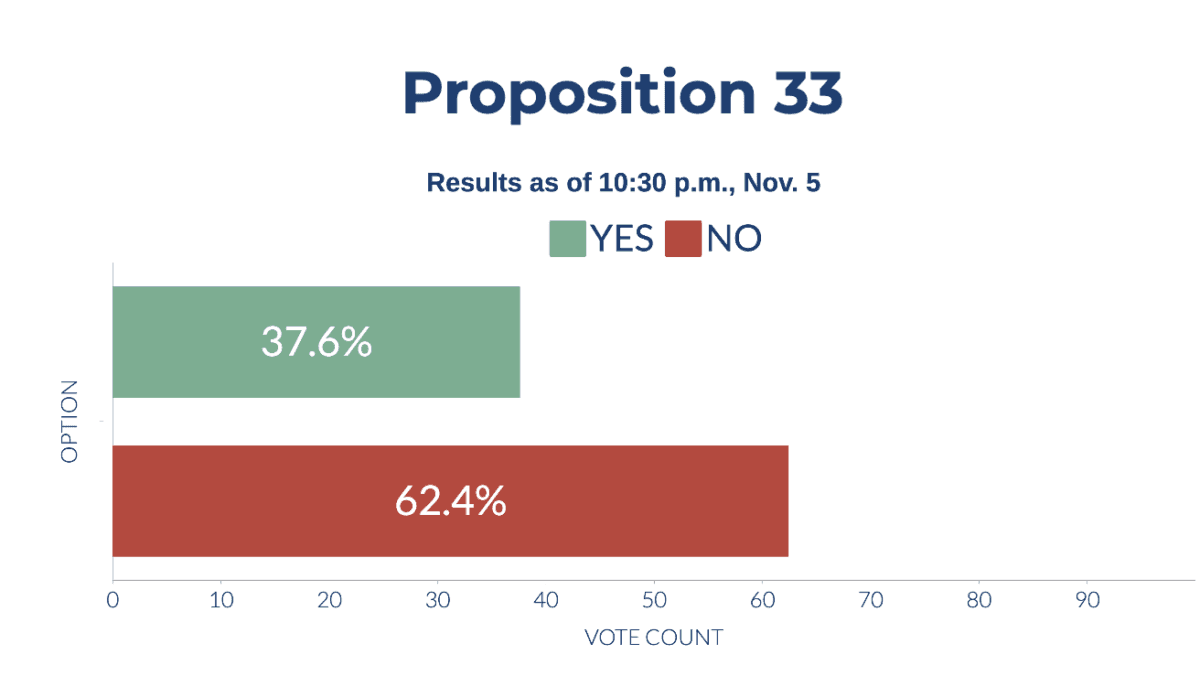
Preliminary results of California's Proposition 33 on Nov. 5, 2024. (Sophie Li/The Epoch Times)
More than 62 percent of voters disapproved of the measure.
Supporters said the law is needed to help reduce rental costs.
Opponents said affordable housing development could be negatively impacted due to what they say are “unintended consequences.”










